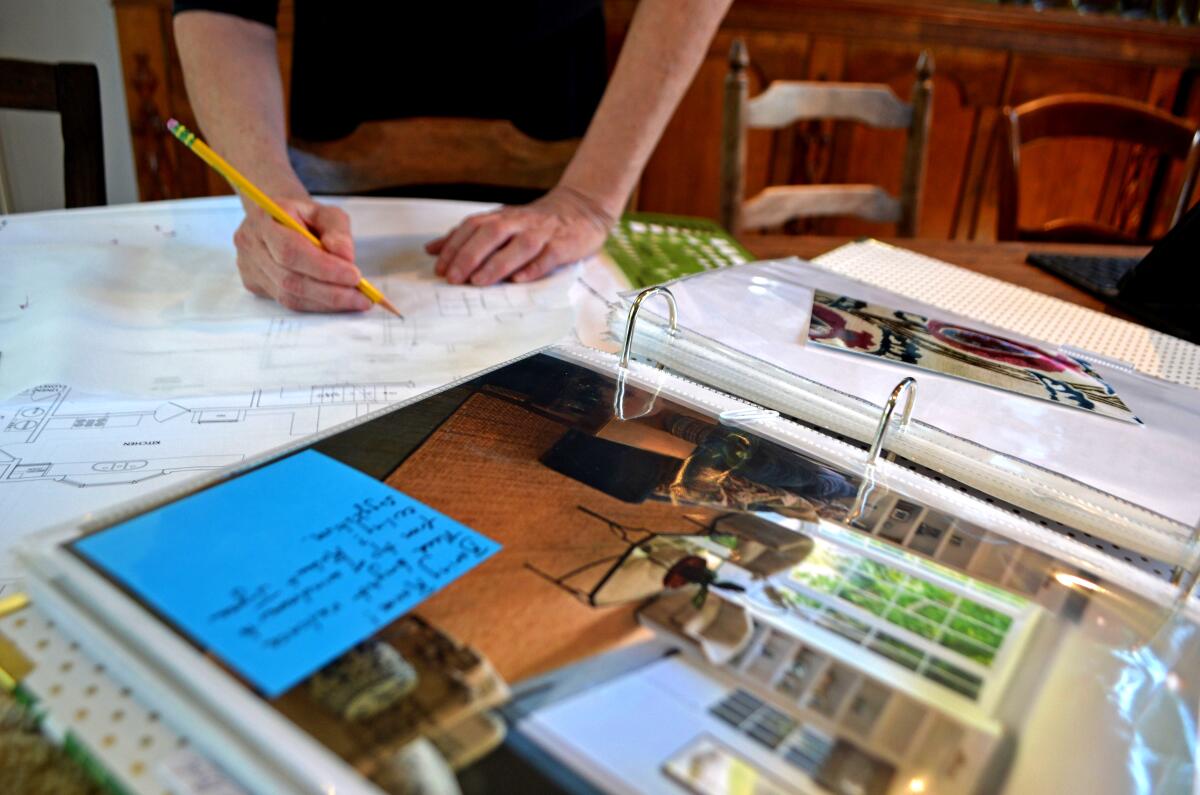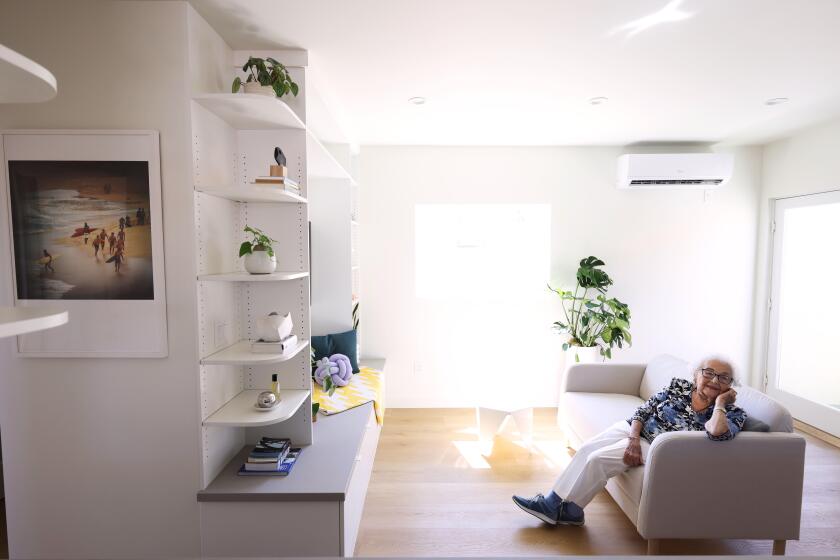How to survive a renovation without destroying your relationship

Scroll through the discussion boards of the home and interior design website Houzz and you’ll uncover a piercing truth: Relationships and renovations clash like wall-to-wall carpeting and avocado kitchen tile. The site is peppered with urgent subject lines ranging from “Wood Tile Grout Color — Save My Marriage :)” to “Help! My husband and I can’t agree on white floors vs grey” to simply, “Save my marriage!!!”
Even before COVID — which, along with sequestering us in our homes, incited a pressing desire to change things amid supply chain nightmares — renovating with a partner or spouse was frustrating. And, while materials may be mostly back in stock, inflation has prompted some prices to as much as double.
Yet we persist. “Everyone’s working on something,” says Charli Penn, executive lifestyle director of Apartment Therapy Media, “and when you’re in a partnership, with that comes a slew of, um, unexpected issues. That presents a challenge for any couple that’s part of what we have to learn to navigate in a healthy, happy relationship.”
While the old adage that your renovation is going to take twice as long and cost twice as much as expected may have a certain amount of unfortunate truth to it, there are ways to lessen the tensions.
1. Get on the same page before you start
“The stress is unavoidable,” says Dr. Harel Papikian, a psychologist who runs the West Hollywood Couples Therapy Clinic in Los Angeles. “It’s not necessarily the renovation itself, but it definitely makes things come to the surface — struggles with power, resentment, unaddressed things in the relationship.” Houzz found 67% of respondents to its 2022 kitchen trend survey felt somewhat to moderately stressed. Only 1 in 5 wasn’t stressed at all. (Lucky them.)
Kimberly Panganiban, a licensed marriage and family therapist and certified Gottman Couples therapist based in San Diego, says renovation can be a perfect storm because it hits so many core things about our lives, from finances to the home. “You’re having to make a lot of decisions pretty quickly, and it feels like these decisions are going to be for a lifetime,” she adds. “Your routine is disrupted; there’s another thing on your already long to-do list, and less time for fun and connection.”
If you’re not already reading this from a gutted room, talk to your partner before you tear down any walls. (Too late for before? Do it now.) Ask the important questions. Is this a good time for this? Who’s going to be in charge? What’s our maximum budget? According to Houzz, 25% of people say they have a hard time sticking to the budget. “Try to set aside 10% to 20% as a contingency for things that could go wrong or things you can’t live without,” recommends Liza Hausman, Houzz’s vice president of industry marketing.
2. Don’t just talk. Really communicate.
Penn suggests that you have a renovation game plan with your contractor, designer and any vendors as well as a relationship game plan that involves how you’re “going to keep each other sane during this process.” Communicate “every choice, every design element, every size, every placement and look each other in the eyes and say, ‘Am I really on board with this? Are you sure you’re going to love it? Are you compromising? If so, tell me why. Can we find a compromise we both love?’ I think sometimes when we say communicate, we think, just talk about it. No, you’re going to comb through the details of this renovation.”
As you hash out the nitty-gritty, “Take the time to slow your conversations down and really hear one another and explore what’s important to each person and why,” says Panganiban. “Most couples jump to ‘What are we going to do?’ But if couples can get out of that problem-solving mode and into being curious about themselves and their partner and understanding one another, they can start to shift into, ‘OK, so then what do we want to do about it?’ When couples enter into that compromise phase from a place of understanding, it goes so much easier.”
Nestled behind a 100-year-old Craftsman in L.A., a 700-square-foot ADU mirrors the home’s period charm and provides housing for an office and extended family.
3. Remember: Your renovation is about both of you
Papikian recommends a regular mind-set check of why you’re doing this in the first place. “We want something — a more beautiful home, a more functional space, we want to expand — whatever it is, we want something and we want it together. Focus on that and making it a shared project we are working on together as a team.”
When things get tense, remember that your partner “is not your enemy. This is the person you love.” Drop any habit of laying blame, which Papikian advises is “always a losing strategy.” Instead, if caught in a difficult discussion, “Ask yourself, is this about me being right, or is this about us having peace and enjoying whatever we were working to create through the renovation?” (Hint: It should be the latter.)
4. Divide and conquer based on your skills
It’s helpful to assign roles based on what people enjoy and are good at, which can increase endorphins during a stressful time. And, as Penn says, “Everyone will have a chance to feel that they have some control over this project, which I think is really important.”
When it comes to DIY, Penn urges communication with your partner about what you can and cannot do; when you realize you’ve bitten off a little more than you can chew, it’s time to step back. “You have to be willing to say, you know what? I thought I could use this drill. I thought I could do the lath on this accent wall. I really had great intentions and great expectations, and it’s not working.” It may be time to pause and call in professional help, or simply pause and regroup.
Remember to praise your partner for whatever work they’re doing well. “It’s great to hear words of appreciation,” says Papikian.
5. It’s OK to disagree
According to a 2018 Houzz renovation survey, nearly a third of respondents found the biggest challenge was agreeing on products, materials and finishes, followed by communication (29%), sticking to the budget (25%) and agreeing on style/design (25%). But conflict doesn’t have to be a bad thing, notes Panganiban. “You can actually grow closer if you welcome the opportunity as a time to get to know one another.”
Give room for both parties to have opinions. Pick your battles and know your non-negotiables, says Papikian. “If we’re picking curtains that are ivory or a natural color, that might be less important than how we place our beds so I can sleep.”
6. Compromise, compromise, compromise (and seek outside help if needed)
“I’m looking at a lamp right now in my dining room that my husband insisted on buying that I hate, but I’ve learned to love it just a little bit because he loves it so much,” says Penn. “And he has to be happy here too. Everyone needs to see a little bit of themselves in the space.” She suggests that couples create Pinterest boards or Apartment Therapy wishlists and share them to see what overlaps that they have in common.
If the two of you can’t make a decision, it can be beneficial to seek outside counsel, including asking a designer, a trusted friend or family member, or, yes, even a (trusted) web forum like Houzz’s, to mediate stalemates over cabinet hardware or paint colors. And, if you find yourself nitpicking imperfections through the process, “Invite over a neighbor and say, ‘What do you think? How does this feel for you?’ If they don’t notice, maybe it’s time to take a breath and say, ‘OK, we can move on from this,’” says Penn.
Why this gay couple from L.A. packed up and bought a home in Yucca Valley.
7. Don’t forget to have fun
If you have a date night, keep doing your date night. If you don’t have a date night, implement one, recommends Panganiban. “Have some designated time to remind yourself, ‘We had a relationship before and we’ll have a relationship after. And we have a lot of things that bond us and connect us.’”
“The last thing you need is for that little bit of your day that should be your own or yours together to be consumed by a renovation that’s already consuming your space,” agrees Penn. “Don’t forget to date, don’t forget to get out of the house, go to dinner and have a conversation that does not involve measurements and paint colors. You have to be intentional about that, and it may really require you putting that on the calendar on a weekly basis.”
8. Repeat after me: It’s all going to be OK
When you find yourself wondering why you started this whole endeavor in the first place, take a step back and imagine the end state, says Hausman: “All of the mess and dust and the people that descended upon your house are gone.” Panganiban adds, “When we went through our renovation, I remember continually reminding myself, no matter what, it’s going to look better than it did before.”
“Ultimately, we want to consider that the renovation is done to create a home, and that contains the relationship,” says Papikian. “If it feels like we are a bit stuck, remember, you want to have a happy, connected, loving relationship. If it means that you’re going to compromise on this thing, maybe that’s worth it, you know?”
More to Read
Sign up for The Wild
We’ll help you find the best places to hike, bike and run, as well as the perfect silent spots for meditation and yoga.
You may occasionally receive promotional content from the Los Angeles Times.












